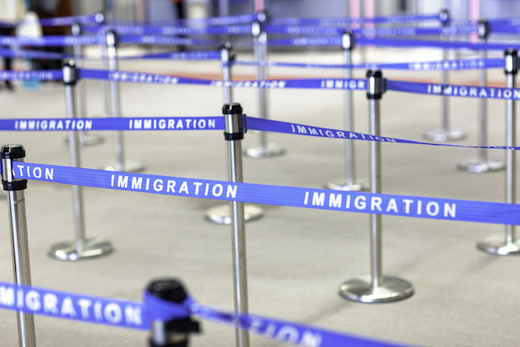
How Big Ag Thrives on Trump’s Immigration Threats
By Amal Bouhabib
Senior Staff Attorney
Speaking on behalf of the Trump campaign last year, Stephen Miller, the mastermind of family separation and other draconian immigration policies implemented by the first Trump administration, proudly described the incoming president’s “mass deportation” plan as an attack on industries that rely on immigrant labor: “Mass deportation will be a labor-market disruption celebrated by American workers, who will now be offered higher wages with better benefits to fill these jobs.”
Miller is right about one thing: Trump’s plan to expel millions of undocumented immigrants and revoke the legal status of thousands of others would be catastrophic for the American economy. And by any measure, Big Ag should be at the top of the list of industries panicked by it. It is an open secret that our food system–from farms to factories–feeds off the labor of undocumented workers and other vulnerable immigrants. It’s estimated that undocumented workers make up anywhere from 30-50 percent of the meatpacking workforce. Foreign-born workers make up an even larger proportion of animal agriculture industries like dairy and pork processing, from 60 up to 90 percent in some states, many of them undocumented.
Deporting these workers would decimate the food industry and Big Ag knows it. So why aren’t they ringing the alarm bell?
For one, Big Ag’s deep ties to the incoming administration will almost certainly spare it from the brunt of Trump’s policy decisions. We saw this during Trump’s last administration, when a tariff-induced trade war with China and other countries caused agricultural profits to tank dramatically. But while small farms collapsed into bankruptcy, Trump’s administration was swift to bail out Big Ag, including doling out some $67 million in “trade aid” to JBS USA. COVID further exposed Big Ag’s sway: cribbing from a memo drafted by the meat industry itself, Trump used the Defense Production Act to keep meatpacking plants open, allowing them to compel their workers to return to work.
But there is a second and more foundational reason they aren’t scared. And that is because the climate of fear produced by even the threat of deportation works for Big Ag. In fact, Big Ag thrives off it.
It’s no accident that immigrant and refugee workers are the lifeblood of Big Ag. The history of industrial agriculture is one of brutal exploitation of racialized and immigrant labor to conduct the physically demanding, back-breaking work of turning animals into food.
Nowhere is this more evident than in the meatpacking industry. From Eastern European immigrants in the 19th century, to women, to Black Americans in the 1960s, the industry moved from one vulnerable group to the next, always finding new ways to turn profits and keep costs down. When Black Americans began to unionize in the 1970s and 1980s, asserting their rights to fair pay and safe work conditions, Southern poultry plants implemented the “Hispanic Project,” aimed at recruiting migrant workers from Central and South America regardless of legal status. As journalist Eric Schlosser quipped, the “invasion,” as the incoming administration calls it, was, in fact, a “corporate recruitment drive for poor, vulnerable, undocumented, often desperate workers.”
And it’s not only undocumented labor that fills the coffers of the food industry. In the last decade, Big Ag has turned increasingly to recent refugees and asylees who have work authorization but limited options for work.
Take Haitians–whom the incoming administration baselessly vilified as pet-eating illegal immigrants. As it turns out, they were neither: allegations of eating cats and dogs proved utterly unfounded, and the Haitians accused of it were lawfully present in the United States as beneficiaries of Temporary Protected Status (TPS), a DHS-designated status for people from countries suffering from conditions that make it hard for them to return.
As of 2024, around 500,000 Haitians have TPS, meaning they are authorized to work, and they do – a substantial number of them in the food system. Although Trump’s mass deportation plan includes ending TPS for Haitians and others like them, these refugees are the ones taking the “dirty, dangerous, and demeaning jobs that Americans refuse to perform” to put food on our tables – whether that’s enduring slave-like conditions to pick our tomatoes, or risking their health and safety to get us our Thanksgiving turkeys.
At FarmSTAND, we have direct experience with this type of exploitation. In October, we filed a charge with the EEOC on behalf of a Haitian worker at JBS in Greeley, Colorado – where an estimated 80 percent of the plant’s employees are foreign-born alleging that JBS is forcing hundreds of Haitian workers to work at dangerous speeds and limiting their access to the bathroom. Our client says he was forced to work at such extreme speeds that his left hand is now permanently locked in the clawed position he uses to hold his hook for eight hours at a time.
Of course, Big Ag justifies their reliance on immigrant labor by citing the lack of a willing American work force, and to some extent, it’s true that Americans don’t want these jobs: killing and cutting up animals has always been “bloody, hard and dangerous work,” but conditions today are much worse than even a generation ago. Wages at meatpacking plants have plummeted a staggering 50 percent since 1975, while injury rates spiked (and then plateaued due to underreporting for fear of reprisal) during the same period. At the same time, line speeds have more than doubled in the past half century, so that workers “can barely move” at the end of their shift, “exhausted from working on a line that turns live animals into processed meat as fast as six times a minute.”
Big Ag thrives on the exploitation of its workers, working them literally to the bone to squeeze out a profit. FarmSTAND saw this firsthand early in the pandemic, when we represented Food & Water Watch in a lawsuit against Smithfield Foods, alleging that Smithfield intentionally flouted worker safety protocols in order to ensure that the production lines kept going–at even higher speeds–all the while misrepresenting to consumers that a countrywide meat shortage was imminent. In fact, there was no shortage. And the plants stayed open, forcing workers into close proximity with insufficient protections, led to approximately 3-4% of all early-pandemic deaths in what a union president called “one of the biggest failures to the working man or woman that this country’s ever seen.”
Meanwhile, as their employees were literally dying to keep the lines moving, the meat processing plants tripled their own net profit margins during the pre-vaccine phase of the COVID-19 pandemic.
It’s pure fantasy to think that expelling the immigrant workforce will compel Big Ag to start treating its employees with respect.
In fact, studies show the opposite is true: in the aftermath of workplace raids, it may be that some American-born workers take the open jobs; but the much more common response is that employers invest less in new business formation, switch to automation, or shut down altogether rather than raise wages or improve conditions. Workers born in the U.S. actually lose jobs: for every one million unauthorized immigrant workers deported, some 88,000 American-born workers are driven out of employment.
Trump’s plan, if implemented, will cause real pain: for the workers whose lives are upended, for consumers who will have to pay more for their meat and milk, for Americans who will lose jobs, and for smaller family-owned operations who won’t be able to survive the elimination of their primary workforce.
But the real cost will be borne by the workers, whether they are targeted for deportation or not. A system that survives by exploitation thrives on fear, and workers who are afraid that they may be ripped from their homes, their families, and their livelihoods and thrown back into a country they fled are more likely to abide the line speed-ups, the lack of safety measures, the harassment, wage theft, and injuries.
We should all be rooting for Trump’s mass deportation plans to fail. But let us also recognize the system that makes it possible to wreak such terror and cause such disruption, and strive for a fairer, more humane way to feed America. FarmSTAND stands by food system workers in their efforts to exert their rights and reclaim their dignity. Explore how FarmSTAND works to protect and expand workers’ rights.

